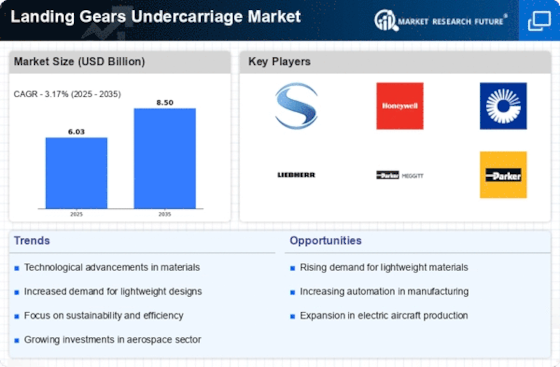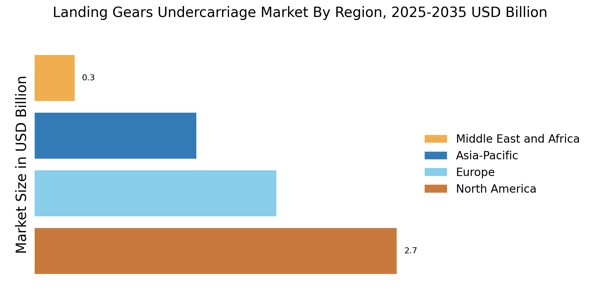Increasing Aircraft Production
The rising demand for air travel has led to an increase in aircraft production, which in turn drives the Landing Gears Undercarriage Market. As airlines expand their fleets to accommodate growing passenger numbers, manufacturers are compelled to enhance their production capabilities. In 2025, the commercial aircraft production is projected to reach approximately 1,500 units, necessitating a corresponding increase in landing gear systems. This surge in production not only stimulates the demand for undercarriage components but also encourages innovation in design and materials, thereby enhancing performance and safety. Consequently, the Landing Gears Undercarriage Market is likely to experience robust growth as manufacturers strive to meet the evolving needs of the aviation sector.
Technological Innovations in Materials
Technological advancements in materials science are reshaping the Landing Gears Undercarriage Market. The introduction of lightweight, high-strength materials such as carbon fiber composites and advanced alloys is enhancing the performance and durability of landing gear systems. In 2025, manufacturers are increasingly adopting these innovative materials to reduce weight and improve fuel efficiency, which is crucial in a competitive aviation landscape. This shift not only contributes to operational cost savings for airlines but also aligns with sustainability goals. As a result, the Landing Gears Undercarriage Market is poised for growth as manufacturers leverage these technological innovations to meet the demands of modern aviation.
Emerging Markets and Regional Expansion
Emerging markets are becoming increasingly pivotal in the Landing Gears Undercarriage Market. Countries in Asia-Pacific and Latin America are witnessing a surge in air travel, prompting investments in new aircraft and infrastructure. In 2025, the Asia-Pacific region is anticipated to account for a significant share of new aircraft deliveries, which will subsequently drive demand for landing gear systems. This regional expansion not only opens new avenues for manufacturers but also encourages local production capabilities, thereby reducing lead times and costs. Consequently, the Landing Gears Undercarriage Market is likely to benefit from this trend as companies seek to establish a foothold in these burgeoning markets.
Regulatory Compliance and Safety Standards
Stringent regulatory frameworks and safety standards imposed by aviation authorities significantly influence the Landing Gears Undercarriage Market. Compliance with these regulations is paramount for manufacturers, as non-compliance can lead to severe penalties and operational disruptions. In 2025, the Federal Aviation Administration (FAA) and the European Union Aviation Safety Agency (EASA) continue to enforce rigorous safety protocols, compelling manufacturers to invest in advanced technologies and materials. This focus on safety not only enhances the reliability of landing gear systems but also fosters consumer confidence in air travel. As a result, the Landing Gears Undercarriage Market is expected to grow as manufacturers adapt to these evolving regulatory landscapes.
Focus on Sustainability and Environmental Impact
The growing emphasis on sustainability and reducing environmental impact is a key driver for the Landing Gears Undercarriage Market. As the aviation sector faces increasing scrutiny regarding its carbon footprint, manufacturers are compelled to adopt eco-friendly practices and materials. In 2025, initiatives aimed at reducing emissions and enhancing fuel efficiency are likely to gain momentum, influencing the design and production of landing gear systems. This focus on sustainability not only meets regulatory requirements but also appeals to environmentally conscious consumers. Consequently, the Landing Gears Undercarriage Market is expected to evolve as companies innovate to create more sustainable products, thereby aligning with broader environmental goals.

















